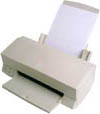The Misplaced Modifier
Recognize a misplaced modifier when you find one.
Modifiers are words, phrases, or clauses that add description to sentences. Typically, you will find a modifier right next to—either in front of or behind—the word it logically describes.
Take the simple, one-word adjective blue. If we add it to the sentence below, where should it go?
At a downtown dealership, Kara bought a truck from a salesman with a comb-over.
Should we locate blue next to dealership? A blue downtown dealership? A blue Kara? A blue salesman? A blue comb-over? Of course not! Logic dictates that blue can describe only one word, truck, so we must place the modifier next to that word:
At a downtown dealership, Kara bought a blue truck from a salesman with a comb-over.
In a similar manner, multi-word phrases and clauses often go right next to the word they describe.
Here are examples:
Gazing out the window, Paul missed the homework assignment that Professor Zuromski wrote on the board.
Gazing out the window is a participle phrase describing Paul, the noun that follows.
Sam gobbled the sandwich, which was soggy with tomato slices, as he rushed to class.
Which was soggy with tomato slices is an adjective clause describing sandwich, the noun before it.
As the hurricane approached, we watched the tree branches waving in the strong breeze.
Waving in the strong breeze is a participle phrase describing branches, the noun in front.
Sometimes a writer places the modifier too far away from the word it should describe. Born in the confusion is a misplaced modifier, an error.
Read these examples:
Churning in the Atlantic Ocean, we anxiously watched the weather report for information about the hurricane.
Churning in the Atlantic Ocean is a participle phrase. In this sentence, it is describing the pronoun we. How illogical! We cannot churn in an ocean!
Raymond wore his one collared shirt to the job interview, which was unfortunately stained with yellow mustard.
Which was unfortunately stained with yellow mustard is an adjective clause. In the sentence above, this clause is describing interview, the noun in front. But an interview cannot get stained with a condiment!
Burnt to a crisp, Professor Jones ruined another bagel in the ancient toaster in his office.
Burnt to a crisp is a participle phrase. In this sentence, the phrase is describing Professor Jones, the noun after it. A more logical candidate is the bagel later in the sentence.
Know how to fix a misplaced modifier.
To fix the error, locate the modifier next to the appropriate word:
We anxiously watched the weather report for information about the hurricane churning in the Atlantic Ocean.
Raymond wore his one collared shirt, which was unfortunately stained with yellow mustard, to the job interview.
In the ancient toaster in his office, Professor Jones burnt another bagel to a crisp.
©1997 - 2025 by Robin
L. Simmons
All Rights Reserved.
